Rise, a musical drama about a teacher who transforms his town through a high school theater production, does not air until March. But the NBC series, which features several LGBT characters, has already sparked controversy -- for its straight lead.
The accusation? Rise "straight-washed" its central character. The term, akin to whitewashing, means an intentional erasure of queer identity, usually for the purposes of appealing to a mainstream audience.
The basis? This character, Lou Mazzuchelli (Josh Radnor), is named after the real-life Lou Volpe, a gay man who fostered his own renowned theater program for over four decades in a Pennsylvania high school. This program was chronicled by one of Volpe's former students, Michael Sokolove, in a nonfiction book, Drama High: The Incredible True Story of a Brilliant Teacher, a Struggling Town, and the Magic of Theater. This book inspired Rise.
So, are NBC and Rise guilty of erasing a gay man's identity? First, here is a review of the events leading to the accusation.
The backlash against Rise began January 9, during a Television Critics Association panel in Pasadena, Calif., with the drama's stars and producers. A reporter asked Jason Katims, the show's straight creator, "if you can talk about why you decided that Lou is straight instead of gay."
In response, Katims, formerly the showrunner of Friday Night Lights and Parenthood, called Volpe "an inspiration" and said "we carry a lot of his spirit into the show." However, he added, "I really felt like I needed to make it, you know, kind of my own story."
"I definitely didn't want to shy away from issues of sexuality and gender," he asserted, referencing a transgender character, Michael (Ellie Desautels), and a gay character, Simon (Ted Sutherland), who are among the students in the fictional high school. But his portrayal of Lou as straight was a "reimagination" of him and his family, which included a major storyline about a son with a drinking problem.
"I felt like it was important to me to honor what the source material was but then to also kind of make it my own so that we would all be able to sort of lean in and do the work that we need to do as actors and writers," Katims said.
Katims's remarks (read the full response at Out for context) were first reported in entertainment industry sources like The Wrap. Negative reactions to the pull-out quotations were immediate on social media. Some users took issue with Katims's assertion that he "needed to make it ... my own story," which they interpreted as clueless straight privilege at best and intentional erasure at worst. "Straight-washing the stories of LGBTQ+ people is nothing new ... but more than disappointing in the year 2018," tweeted LGBT Fans Deserve Better, a group that advocates for queer visibility on television.
"Straight-washing" caught fire. The term was used in the subheading of Huffington Post Queer Voices' coverage and migrated to the headlines of LGBT sources like Pride and to gossip sites like Perez Hilton. Among queer outlets, the disgust was nearly universal. "Rise Changes Their Gay Character to Appease the Masses!" exclaimed Instinct magazine, with many of its readers writing vows to boycott the show in the comments.
Outraged folks even launched a petition, titled "NBC Straightwashed the Main Character in Rise," demanding that the network rewrite Lou as a gay character. "Not only did they miss a chance to kindly represent a community that is misunderstood and misrepresented so often in media, but they practically slapped the actual man in the face by changing a huge part of who he is," the petition declared. At the time of this article's publishing, it has almost reached its goal of 15,000 signatories.
Rise then shifted into damage control. On January 13, the show's executives producers -- Katims, Jeffrey Seller, and Flody Suarez -- released a joint statement that defended the drama against what they called a "misinterpretation" of Katims's remarks. They clarified that Rise is not an adaptation of Drama High but rather an original story that is inspired by the book as well as Volpe's life rights.
The differences between the book and the show are distinct enough that, as Entertainment Weekly first pointed out, Katims received a "created by" credit from the Writers' Guild of America instead of a "developed by" credit. Other than the central idea of a "Lou" teacher who runs a theater program, the town, its characters, and their storylines are pure fiction.
"The misinterpretation by some of what we've done with this show goes against what we fundamentally believe and who we are as individuals," the executive producers stated. "We are firmly committed to LGBTQ inclusion, and most of all, are excited for the community to see Rise, which we believe portrays positive depictions of LGBTQ characters and stories on broadcast television with honesty and sensitivity. To that end, we worked with GLAAD on the show's LGBTQ storylines to ensure they are told with respect and authenticity."
It was GLAAD -- an organization that advocates for positive LGBT representations in the media -- that connected The Advocate with representatives from NBC. The network made available the first five episodes of the series to showcase these positive depictions before offering interviews with Katims, Seller, Suarez, Volpe, and Bob Greenblatt, the gay chairman of NBC Entertainment.
If one factors the controversy of its central character out of the equation, Rise represents a win for LGBT visibility in several respects, through storylines that were crafted with GLAAD's advisement. The gay character, Simon, has a major and moving storyline where he comes to terms with his sexuality in a religious household, while also playing a gay character in the fictional town's staging of Spring Awakening. The transgender student, Michael, is portrayed by a nonbinary actor -- and the character's determination to use the boys' changing room and stand up to anti-LGBT bullies in a working-class town feels vital in the current political moment.
In addition, Lou's sister-in-law is in a same-sex relationship -- a groundbreaking detail because her sexuality is not a central plot point but an unremarked-upon reality within the show's world. Overall, the show has a large ensemble cast, which comprises not only LGBT identities but also race, class, religious, and ethnic diversity.
"NBC is a trailblazer when it comes to LGBTQ content - from the first run of Will & Grace to William's groundbreaking bisexual storyline on This Is Us," said Sarah Kate Ellis, GLAAD's president and CEO. "LGBTQ youth especially deserve to have their lives depicted on broadcast TV. When young viewers meet the new LGBTQ characters on Rise they will see their own stories being told, and countless viewers will gain a better understanding of the issues some LGBTQ high school students face today."
"At a time when acceptance of LGBTQ people is slipping and moving backward, entertainment media is more important than ever in telling LGBTQ youth that they are not alone and showing audiences stories about our lives that can truly move the needle," Ellis added.
Greenblatt, outlining these strengths of Rise, said the "straight-washing" criticism is "unfortunate ... because as you watch yourself, you see that there are big storylines that are about sexual orientation, and transgender [issues], and acceptance, and diversity, and inclusion. And it's too bad that we have to even have this conversation, as the show is so much about that."
There's also the central argument of the show -- a defense of the value of theater in an era when the arts are under attack. The fight of Lou and his assistant director, Tracy (Rosie Perez), for funding and recognition will resonate with creatives the world over, including Greenblatt. "This is a personal story for me," said Greenblatt, who first supported the premise of a show centered on a transformative high school theater director after being approached with the idea by producers Seller and Suarez. Afterward, they brought the concept to Katims, who then signed on as a creator.
In fact, Greenblatt said he would not be where he is today -- the only out chairman of a broadcast television network -- without the theatrical experiences he had growing up in Rockford, Ill. Notably, he first heard the name Stephen Sondheim while participating in a community theater production of A Little Night Music. "I did props," said Greenblatt, who admitted he is "mortally terrified of being onstage" as an actor. While he does not want Rise to be "pigeonholed as a theater show," he hopes it cuts against the notion that theater is an "elite" activity.
Which leads to the show's intended audience. A major concern among "straight-washing" critics was, as Instinct feared, that NBC was aiming to "appease the masses." (In 2014, NBC was accused of bi erasure in Constantine, whose original character in comic books was bisexual.) Does the network have any hesitation in 2018 about airing a show with a gay lead? "No, not anymore," declared Greenblatt, a reference to the predominance of straight leads throughout network TV's history. "I'm not going to claim we're the gayest broadcast network, but we might be," he added, pointing to shows like Will & Grace as well as characters in the upcoming Good Girls, starring Mae Whitman and Christina Hendricks.
However, Greenblatt did call straight-washing "a problem" that is "ongoing" in the entertainment industry. For Greenblatt, the red line of straight-washing stands at the point where the LGBT identity of "a character or a real human being" is changed. "You can't change something that prominent in their identity," he said. By this logic, Rise would have crossed this line if it had been a direct adaptation of Volpe's life rights. Thus, Greenblatt considers Rise's Lou to be an original character -- albeit one with a first name that pays respect to its inspiration. "I had a drama teacher in my high school who very much resembles the drama teacher and the family in this show. It's not based on his life either," he said.
Katims, in a separate telephone interview, seemed pained that his TCA statement about making Volpe's story "my own story" was interpreted in the manner it was. "I think that was a regrettable phrase," admitted Katims. "I certainly didn't mean to say that he needed to be heterosexual in order for me to be a character that I could relate to. ... There's not a writer in the world who would say 'I can't write a character that is any different from myself.' So that is absolutely not [my meaning]. And it's horrifying to me that that's the way it was it was interpreted."
Seller, who in addition to Rise has produced Tony-winning shows like Rent and Hamilton, defended Katims. "I was very thrilled with the direction that Jason was taking," he said. "As the gay expert, I'm really happy with what we did. And frankly I was pissed off by people that were questioning it without even watching the first season," added Seller, who proudly noted his roles as a gay husband, father, and longtime supporter of the Family Equality Council.
In light of the criticism, would Katims ever consider giving Lou a coming-out story? After all, the real-life Volpe spent most of his career in the closet. "I've learned to never say never" in television writing, said Katims -- although he claimed this storyline was not part of his original "trajectory" for the character.
Katims clarified his reasoning for making Lou straight in a follow-up statement through email:
I deeply understand the frustration here, and the wish to see more LGBTQ-identifying characters at the center of broadcast television shows. However, I was never setting out to do an adaptation of Lou Volpe's story -- but instead create a large ensemble drama that was not a retelling of the original story, but instead served as a jumping off point and an inspiration. That required a re-imagining of everything, with new and original characters and storylines, including rethinking Lou's character. The thing I want people to know is that Rise very much leans into and celebrates LGBTQ story lines.
[...]
I have strived to make Rise feel as inclusive as possible -- in addition to the storylines I mentioned, the first season introduces a character with Down Syndrome, a Sikh character and one of the show's most prominent romances is built around an African-American teenage boy and a teenage girl who is part Latina and part of Pan-Asian descent. In future seasons, I fully intend to incorporate a prominent adult character who identifies as part of the LGBTQ community. I am as proud of Rise as any show I've ever worked on, and am excited for people to see it.
However, even after the statements and clarifications from Rise's producers, there are still those who consider Lou's sexual orientation an act of straight-washing. Among them is LGBT Fans Deserve Better, the group that was among the first to accuse the show of queer erasure.
"While we're happy to hear that the show overall is 'firmly committed to LGBTQ inclusion,' that doesn't change the fact that they're altering the sexuality of the real person behind the inspiration for the show to fit the story they want to tell, and in doing so, 'straight-washing' the character," said a statement released by the organization.
"More often than not, this is exactly what happens with historical figures; the LGBTQ elements in their life are either omitted or glossed over to avoid directly implicating queerness," it continued. "Additionally, when it comes to portrayals of LGBTQ characters onscreen (fictional or not) they are mostly relegated to secondary roles. So when a showrunner and a network make a decision like this, it indicates that our stories are not worthy of being at the forefront."
LGBT Fans Deserve Better also said Rise missed an opportunity to make history: now the upcoming CBS show Instinct, starring Alan Cumming, will become the first broadcast network drama with a lead gay character. "Rise had the chance to be that groundbreaking show and instead, they chose to create yet another show with a straight, white, male lead," the group concluded.
So what does the real-life Lou, who served as a consultant on Rise, think about this controversy?
"About two years ago, when I heard that Drama High was going to be a TV series on NBC, I initially thought the series was going to be an adaptation of the book, so I just assumed the character would mirror me," said Volpe, who at first presumed the character would be gay.
That changed when Katims visited him at his home in Bucks County, Pa. Over dinner, Katims made it "very clear," said Volpe, that the show would be inspired by the book, not an adaptation of it. "So, for me, 'straight-washing' the character was never an issue, because he is not based on me. As an artist, I respect their vision for the show," said the retired instructor, who recommended that those who wanted to learn about his groundbreaking experience as a drama teacher read Drama High.
Volpe does see similarities in Rise's Lou, among them "dedication, passion, love of kids, and the realization that education is, especially in this day and age, important for success." However, "as people we are definitely fundamentally different," he clarified.
As to whether he would have pursued his calling as drama director if he had been straight, Volpe said that being "a gay man has definitely influenced so many decisions that I've made in my life." But he also credited his upbringing for kindling his artistic passions. "My parents encouraged me to be myself from a young boy and took an active role into introducing me to the arts. I'm not sure I would have been a drama director at a high school, but I am sure I would have pursued a life where I could use my gifts and intuition in a creative way," he said.
Above all, Volpe hopes people will put aside their outrage to give Rise a chance, in order to learn from it what he has always taught: "The value of an theater arts education and its importance in the life of a high school student."
"So many of my students were looking for a sanctuary, a place to feel safe and accepted where they could be them themselves and express and explore their talents and feelings without fear of reprisals and bullying," he said. Volpe called his theater program "a place to laugh for a while, to make some friends with similar interests and passions, and escape from a system that often kept many of these kids alienated and rejected."
"The stage was where you could explore, risk, trust, and even celebrate yourself," he continued. "It was a place of empowerment and also a world where discovering the power of your imagination was limitless. Ultimately, it was a place of change, of rebirth and recognizing the vast possibilities of the potentials and wonders of being human."
"In the final analysis, it was, as Stephen Sondheim teaches us in his masterpiece Sunday in the Park With George, 'a blank page or canvas ... so many possibilities.'"
Rise premieres March 13 at 10 p.m./9 p.m. Central.
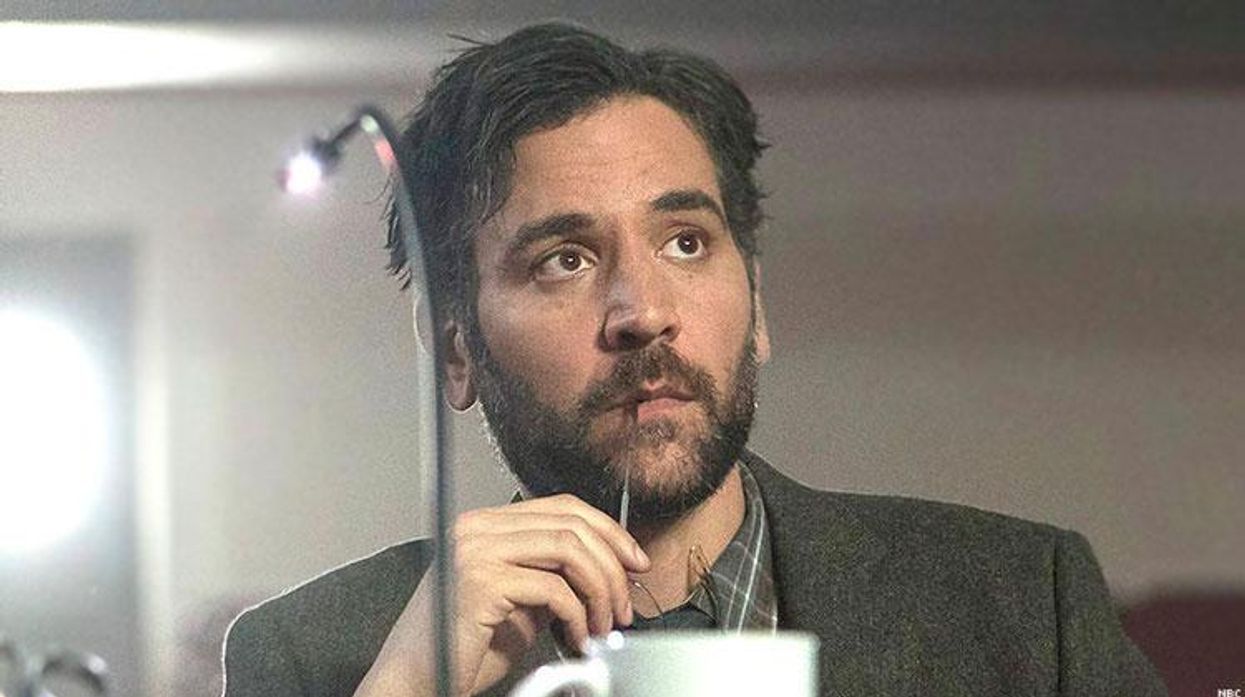





























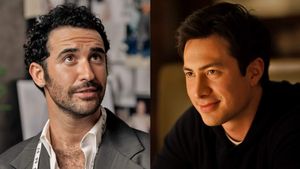









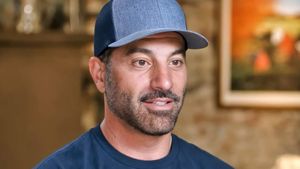












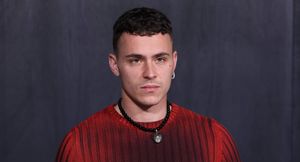












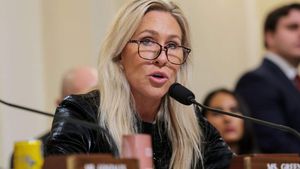

Charlie Kirk DID say stoning gay people was the 'perfect law' — and these other heinous quotes